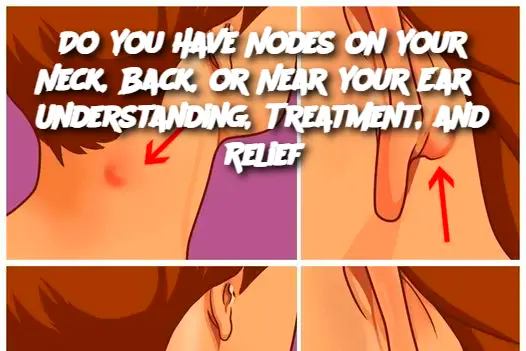ADVERTISEMENT
Introduction
Lumps or nodes appearing on the neck, back, or near the ear can be a source of concern for many people. These nodes, often referred to as lymph nodes, are part of your body’s immune system. However, there are several other types of growths or masses that can appear in these areas. Understanding what these nodes are, their causes, and how they can be managed is crucial for your health.
What Are Lymph Nodes?
Lymph nodes are small, bean-shaped glands that are part of the lymphatic system. They act as filters, trapping viruses, bacteria, and other foreign substances that can harm the body. When an infection occurs or your body fights off an illness, the lymph nodes can swell as they work harder to filter out harmful agents.
However, swelling in the lymph nodes can also occur due to non-infectious causes such as autoimmune diseases, cancer, or injury. Lumps near your ear, neck, or back should not be ignored, and it’s essential to understand when to consult a medical professional.
Common Causes of Nodes on the Neck, Back, or Near the Ear
Infections:
Upper Respiratory Infections: Cold, flu, and throat infections can cause the lymph nodes in the neck to swell.
Ear Infections: Infections near the ear can lead to swollen lymph nodes in that area.
Injury or Trauma:
Trauma to the skin, muscles, or bones can lead to swelling as your body responds to the injury.
Cancer:
Lymphomas or metastasis of cancer cells can cause swelling of lymph nodes. These are often painless and persist even when there are no symptoms of infection.
Autoimmune Diseases:
Conditions like rheumatoid arthritis and lupus can lead to swollen lymph nodes as part of the body's inflammatory response.
Signs You Should Seek Medical Attention
While most nodes are harmless and resolve on their own, there are certain signs that indicate you should consult a healthcare professional:
If the node is hard, immovable, or continues to grow.
If there’s persistent pain or tenderness.
If you experience fever, night sweats, or unexplained weight loss.
If the node appears after a recent injury and doesn’t resolve.
Treatment Options for Swollen Nodes
Home Remedies:
Applying a warm compress to the swollen area may help reduce swelling and alleviate discomfort.
Over-the-counter pain relievers such as ibuprofen or acetaminophen can help with pain and inflammation.
Antibiotics or Antivirals:
If an infection is the cause, antibiotics or antivirals may be prescribed.
Surgical Intervention:
In rare cases, if a lymph node needs to be removed or if it's caused by a tumor, surgical intervention may be necessary.
Prevention Tips
Maintain Good Hygiene:
Regular hand washing and avoiding close contact with infected individuals can help reduce the risk of infections that cause swollen nodes.
Manage Stress:
Chronic stress can weaken the immune system, making you more susceptible to infections. Try to find healthy ways to manage stress.
Stay Active and Eat Well:
Regular exercise and a balanced diet boost your immune system, keeping your body prepared to fight infections.
Serving and Storage Tips
Monitor your symptoms: Keep track of when the swelling started, its size, and any associated symptoms (fever, pain, etc.).
Keep track of your health: If you’ve had recurring swelling of the nodes, keeping a journal of your health can help your doctor make a better diagnosis.
Variation in Causes and Symptoms
ADVERTISEMENT
